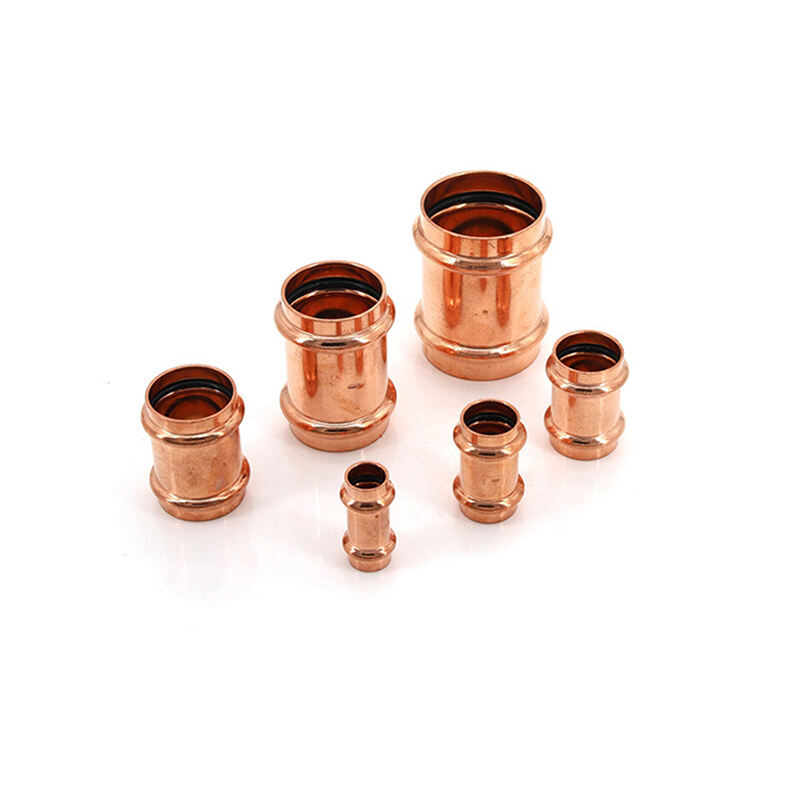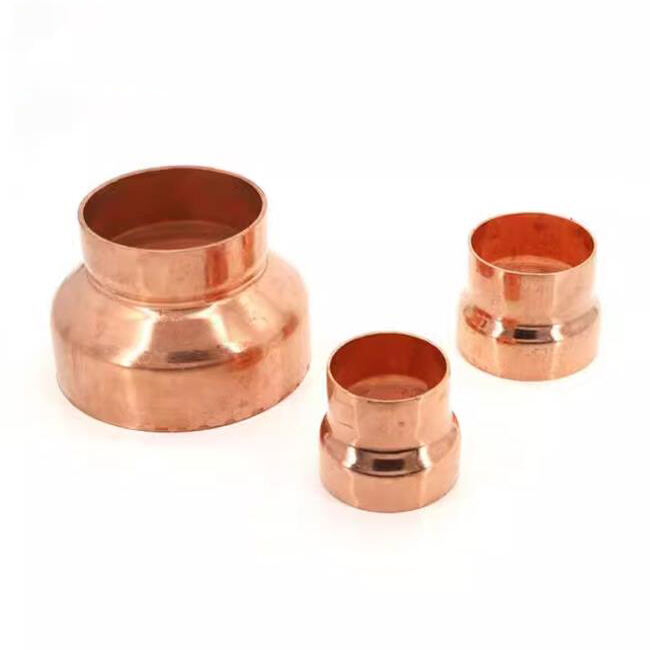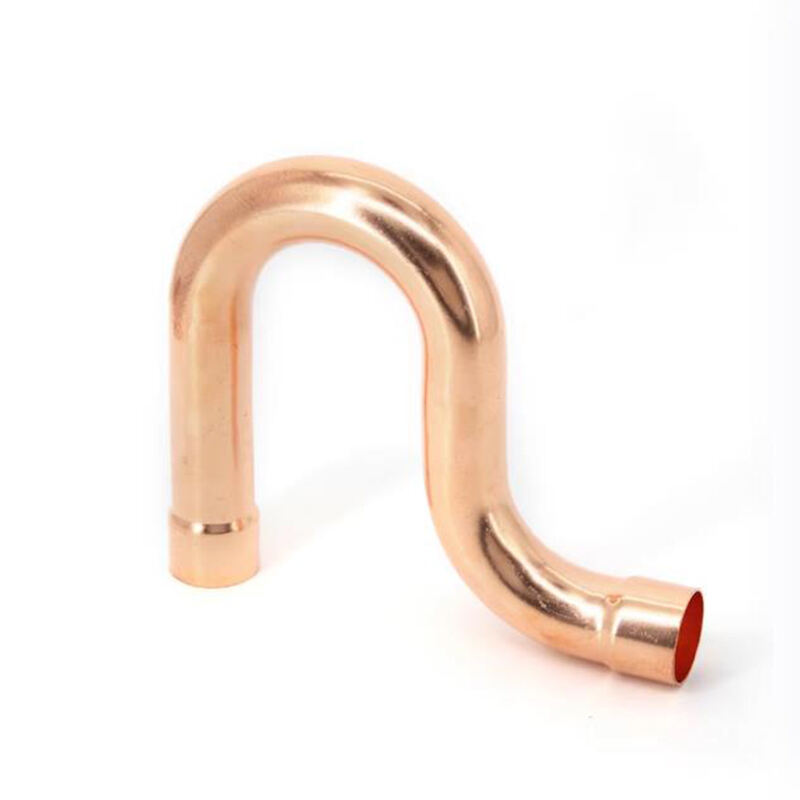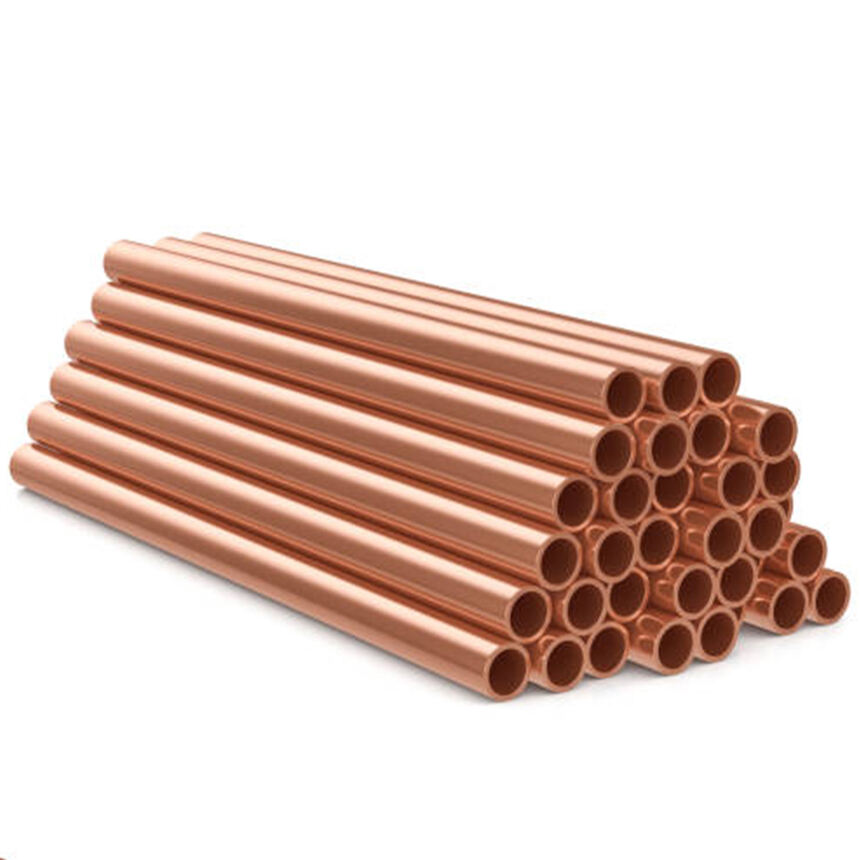Benefits of Copper Pipe Fittings and Tubing in Modern Systems
Durability and Corrosion Resistance
Copper pipe fittings last forever basically, sometimes going well past 50 years in service, so they work great in today's plumbing setups. What keeps them going so long? Well, copper develops this natural protective coating called a patina over time. The stuff acts like armor against rust and other kinds of damage, keeping the pipes working properly for decades. Maintenance bills tend to be much lower with copper systems when compared to options like PVC or old fashioned galvanized steel pipes. For anyone looking at long term value, copper fittings really stand out because they don't need replacing every few years and resist corrosion without special treatments.
Thermal Conductivity for Efficient Plumbing
The way copper conducts heat so well is why plumbers often pick it for their work, particularly when dealing with hot water lines throughout buildings. When water flows through copper pipes, it picks up heat much faster than other materials, something that really matters if we want our showers at just the right temperature without wasting resources. Homeowners notice this too since switching to copper tends to cut down on monthly utility costs pretty significantly. Studies have shown similar results across different settings where copper was installed instead of alternatives. The metal simply transfers heat so effectively that heating systems don't have to work quite as hard to keep water warm as it travels from boiler to tap.
Applications in HVAC and Industrial Settings
Copper fittings are pretty much essential for HVAC systems and various industrial setups because they hold up so well in all sorts of environments. When it comes to HVAC specifically, copper can handle extreme heat and pressure without breaking down, which means these systems work reliably day after day. For industrial purposes too, copper stands out since it doesn't react badly with most chemicals, making it safe for moving different kinds of fluids through pipelines. A lot of official guidelines even require copper components in certain situations where failure isn't an option. The fact that so many industries keep choosing copper speaks volumes about its value. It just keeps working without issues for years on end, which is why manufacturers continue to rely on this metal despite newer alternatives entering the market.
Types of Copper Fittings and Tubing for Procurement
Common Copper Fittings: Elbows, Tees, and Couplings
In plumbing systems, copper fittings such as elbows, tees, and couplings play a vital role. When installing pipes that need to turn corners or navigate around obstacles, elbow fittings come into play. These bends make all the difference in complicated setups where straight runs just won't work. For situations where three pipes need to meet at once, tee fittings provide the solution. Plumbers often rely on these when creating branch lines off main supply lines throughout homes and buildings. Couplings might seem simple but they're indispensable for joining sections of pipe together along straight runs. Most plumbers will tell anyone who asks that knowing when to use each type matters a lot depending on what kind of job needs doing. Some jobs call specifically for certain fittings over others based on space constraints or pressure requirements within the system.
Copper Tubing Variants: Type K, L, M, and DWV
Knowing what kind of copper pipe we're dealing with makes all the difference when working on plumbing jobs. Type K has those extra thick walls which makes it great for running pipes below ground where they need to withstand pressure from soil and traffic over time. Most plumbers reach for Type L in everyday installations since it strikes just the right balance between being sturdy enough yet still flexible enough to work with during installation. Then there's Type M, which isn't as thick but saves money without sacrificing too much performance, so many homeowners choose this for their regular water supply lines throughout houses. Don't forget about DWV tubing either. These special pipes handle drainage, waste removal, and ventilation systems separately. Getting the right type matters a lot because local building codes often specify minimum requirements, and using the correct material helps avoid leaks or failures down the road that would cost even more money to fix later on.
Brass vs. Copper: Selecting the Right Material
The debate between brass and copper for plumbing fittings comes down to what matters most in the job at hand. Brass definitely holds up well over time, but copper simply resists corrosion better, which means fewer headaches down the road. That alone makes copper worth considering for many installations. And there's another angle too copper naturally fights bacteria growth, so pipes stay cleaner longer without needing special treatments. For anyone actually making these decisions, looking at what the system will face day to day, how much money is available upfront, and what kind of lifespan they want from the materials all play into the final pick. Most plumbers I've talked to would lean toward copper if budget allows, especially where water quality is important or where leaks could cause serious problems later on.
Material Certifications (ASTM, NSF) and Compliance
Copper pipe fittings and tubing need to satisfy particular material certifications like ASTM and NSF standards if they're going to work properly and stay safe in any plumbing job. The ASTM certification basically means the product meets specific requirements for how it looks physically and what chemicals make it up. NSF compliance tells us these parts won't contaminate drinking water when installed correctly. Most plumbers know that certified fittings go through all sorts of tests before getting approved for sale, which gives them peace of mind about their work quality. Also important? Checking those local building codes carefully. A lot of contractors have learned this the hard way after facing fines or having to redo entire jobs because something wasn't code compliant right from the start.
Evaluating Supplier Credentials and Global Networks
Checking out what suppliers bring to the table is really important when looking for manufacturers who actually deliver good quality stuff consistently. How extensive a supplier's reach around the world tends to affect how fast we get our goods and what they cost. Companies with operations across multiple regions generally handle material sourcing better than those limited to one area. When vetting potential partners, look at how long they've been around, read through what other customers say about them online, and check if they follow recognized quality standards. All these points help make sure whoever gets selected can actually deliver what needs to be delivered on schedule without compromising on quality standards.
Balancing Cost and Quality in Bulk Procurement
Finding the sweet spot between what we pay and what we get matters a lot when buying copper fittings and tubes by the truckload. Sure, cheaper stuff looks good on paper at first glance, but those savings often come back to bite us later when the materials just don't hold up under pressure. Many companies find better deals by teaming up with others for bigger purchases, which still lets them keep their eye on quality. Looking around the market makes sense too. When we track how prices move over time, we avoid getting stuck paying too much or settling for poor quality. Smart shopping like this pays off down the road, especially since plumbing systems need to last years without leaking or failing unexpectedly.
Why Choose Yiwu Jufang Technology for One-Stop Procurement
Expertise in Copper and Brass Plumbing Solutions
The team at Yiwu Jufang Technology knows their stuff when it comes to copper and brass plumbing systems. They've worked on countless projects over the years, so when customers come in looking for advice, they can point people toward the right products based on what actually works in real world situations. This kind of hands-on experience makes all the difference for buyers who want peace of mind knowing someone with real industry background is helping them make decisions. That's why so many businesses turn to Yiwu Jufang when they need reliable plumbing solutions that stand the test of time.
Streamlined Global Supply Chain Access
The strong supplier network that Yiwu Jufang Technology has built over years means they can get copper and brass fittings to customers quicker and with fewer hiccups along the way. With their worldwide logistics setup, they keep inventory levels just right so there are no unexpected holdups when materials are needed. Good supply chain operations really cut down how long projects take from start to finish. Most importantly, this approach keeps everything moving smoothly while still maintaining high standards for product quality across all deliveries.
Commitment to Quality Assurance and Industry Standards
Yiwu Jufang takes quality control seriously, making sure everything they produce hits or beats what's expected in the industry. They run regular checks on their whole supply chain operation, from raw materials right through to finished goods. These ongoing evaluations help keep product quality consistently high, something customers notice and appreciate over time. Their focus on getting things right has built up a solid reputation in the plumbing solutions sector. Clients know when they deal with Yiwu Jufang, they're getting products that work reliably day after day without surprises down the line.
One-Stop Procurement Advantages with Chart Overview
Yiwu Jufang Tech offers all sorts of pipe fittings and piping solutions that make buying easier since they carry so many different options in one place. The company stocks plenty of copper and brass parts for plumbing work, saving buyers both time and money compared to shopping around at multiple suppliers. Many clients appreciate not having to deal with several vendors for their projects. One contractor mentioned how he was able to complete an entire bathroom renovation without making extra trips to different stores, which really cut down on delays and hassle during installation.









